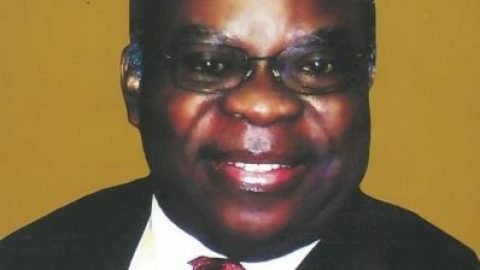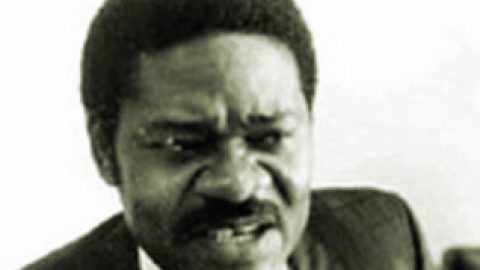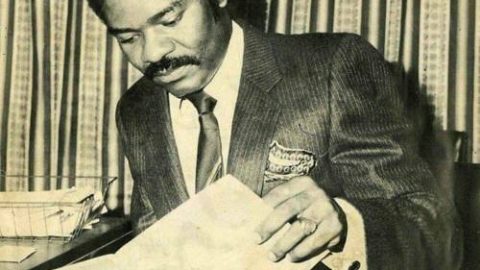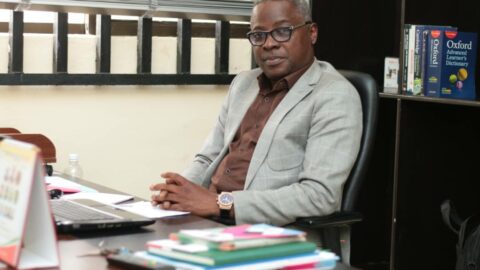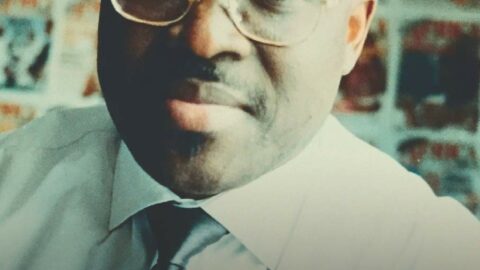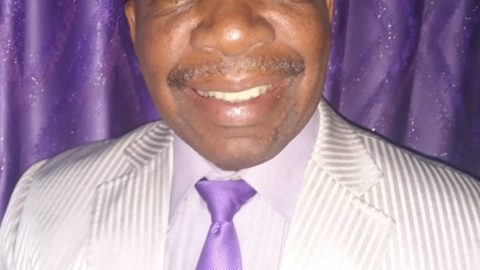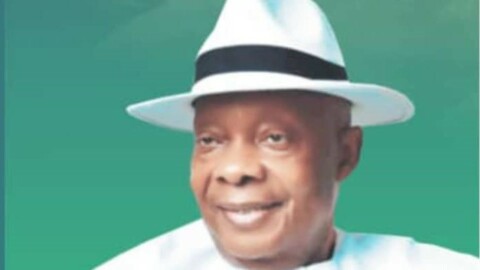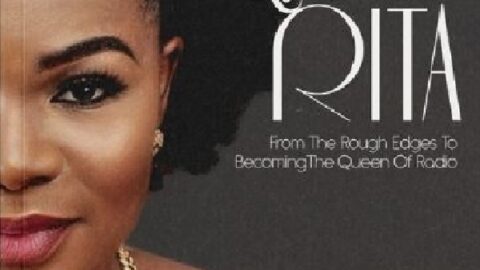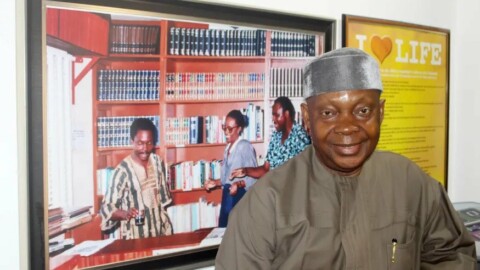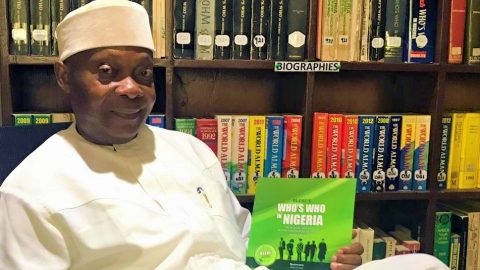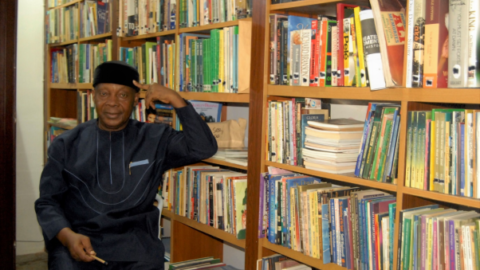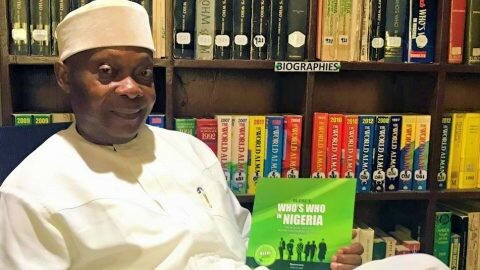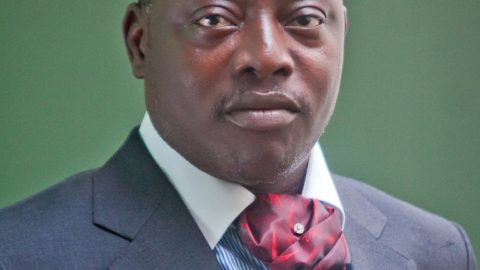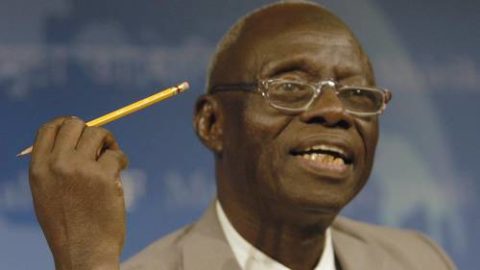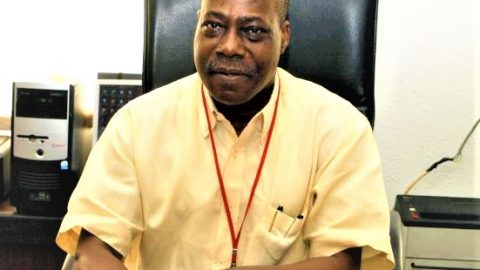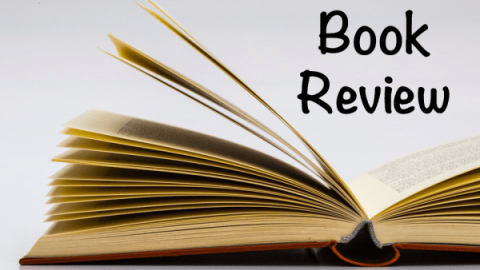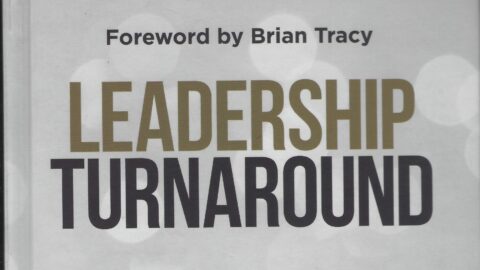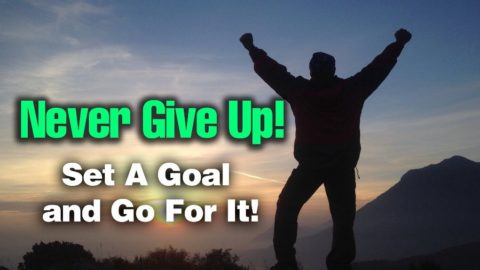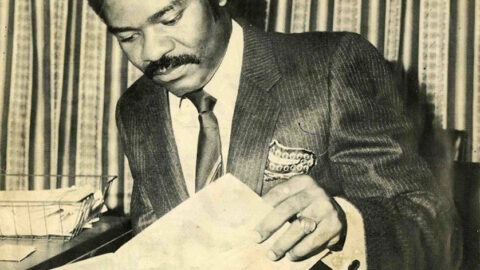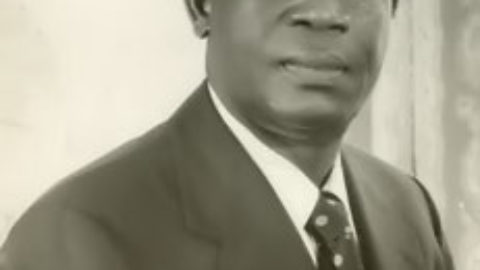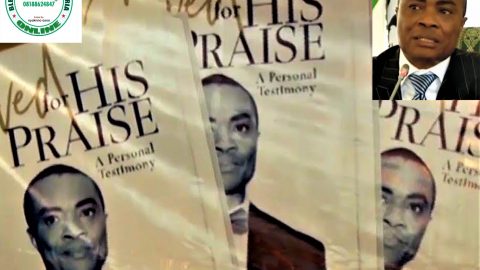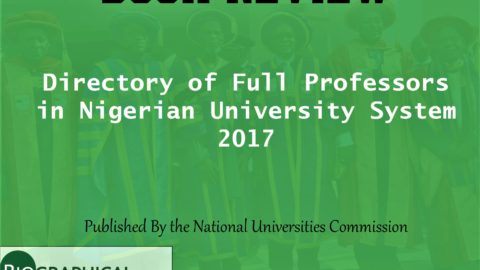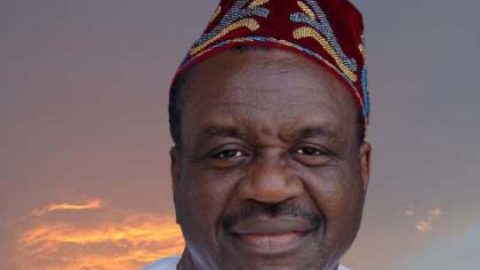He was a foundation member of the team that set up pacesetting Newswatch magazine, published by the trio of Dele Giwa, Ray Ekpu and Yakubu Mohammed. Nyaknno Osso was the Librarian and later Editor of the celebrated “Newswatch’s Who Is Who In Nigeria.”
For over 25 years, he said he worked closely with former President Olusegun Obasanjo to set up the Obasanjo Presidential Library.
In this interview, Mr Osso spoke with our Business & Economy Editor, Bassey Udo, in his residence in Abuja about these years and personalities as well as his new national legacy project spearheaded by his Foundation, the Biographical Legacy & Research Foundation (BLERF).
Excerpt:
PT: As the former Editor of the “Newswatch Who Is Who”, how did you come by the idea?
Nyaknno: When Newswatch magazine was to be established, Dele Giwa, Founding Editor, was in Calabar to see his friend, Ray Ekpu, at the Nigerian Chronicle where I worked as the Head of the Library Department.
After Giwa met me, he later told Ray, my boss and mentor, that he had discovered someone he would invite to join the foundation team at Newswatch they were planning to set up then. He acknowledged I was the best in what I was doing.
Giwa said Newswatch was going to be like Time magazine and would require a lot of research and documentation. Therefore, they would count on my library experience.
When I got to Lagos in July 1984, our first assignment was for us to brainstorm for several hours as we began the planning to for the birth of Newswatch.
At the end, we decided to do a comprehensive documentation of the subject areas Newswatch magazine might be dealing with when it starts publication.
We got about 1,000 subject areas that bordered on background information materials to enable Newswatch start-off.
My assignment was to spend about six months travelling around Nigeria and the world gathering background information and materials on all subjects.
I went to Financial Times, BBC, New York Times, Time, Washington Post, CNN, British Museum in London, Newspaper Library in Colindale and other places.
At the end of the trip, I came back with so much information about all sorts of subjects that was more than what Newswatch needed.
Then, one day I asked myself: How do I take these information, refresh, repackage and make them available in a book form for journalists?
I went to a Library School. Within the period I worked with the Nigerian Chronicle, I made contacts with all the relevant agencies within and outside Nigeria that could help in building an information bank capable of giving sufficient background information on all subjects.
I resolved to apply my mind to it. I began to gather and write the information in longhand, get it typed, create cards, filed and arranged them in alphabetical order. That was what came out later as “Newswatch Who Is Who” in Nigeria.
PT: Where did you get the drive to do all that?
Nyaknno: That passion of trying to make what was happening in other countries of the world happen in Nigeria was what drove me.
I have been out there and saw what others have done. I read a lot about what other people were doing. I thought I should be a pathfinder in Journalism Librarianship – building an information resource bank for journalists.
PT: After your stint at Newswatch, you moved on to another challenge. Where did you go?
Nyaknno: That’s one question I knew I was not going to escape from. I am going to talk about that phase of my life with all sense of responsibility because it was part of my contribution to information management and storage (preservation) in Nigeria.
Information is life. Certain families in Nigeria do not have records of their children’s birth. We are still not very keen on records keeping. It takes an organised nation to make progress.
That is how I came to be involved with a project that occupied my time and energy after Newswatch. I am talking about the Olusegun Obasanjo Presidential Library.
PT: Yes, tell me, how did you come about the project?
Nyaknno: Remove the controversy about presidential libraries. I got interested in the Presidential Library project after my visit to the Clinton Presidential Library.
Before the Clinton Library, a group of first-class American minds sat down and drew the Clinton Foundation and library.
They were already planning the stages and direction development would go, the new challenges that would come up.
They had a sense of vision and mission of where their country was going; preparing and making sure the foundation is laid.
I thought Nigerian presidents should also think along that line. Information about how they managed their office could be gathered, documented and put out as part of Nigeria’s history so that generations after would learn from their mistakes and how to make the right decisions and the way forward.
PT: How I came to be involved with the project is very interesting.
Nyaknno: was at Newswatch one Saturday morning in 1988. I saw a news story in the Daily Times that President Olusegun Obasanjo was planning to set up the African Leadership Forum to train leaders for Africa.
Then, he had left office in October 1979 as Nigeria’s military Head of State. He was then the Vice Chairman, Eminent Persons’ Group fighting for the release of Nelson Mandela from prison by thee apartheid regime in South Africa.
That morning, on seeing that publication, I immediately reached for Dele Giwa’s notebook he used to jot down things when interviewing people. I saw the notes he took when he interviewed General Obasanjo as the Editor of Sunday Concord. I saw General Obasanjo’s secretary’s telephone number.
Surprisingly, when I called, somebody with a husky voice answered.
“Who is this?” the voice said. “My name is Obasanjo. General Olusegun Obasanjo,” he added.
I was momentarily thrown off balance. I almost dropped the telephone immediately.
I was not prepared for that encounter. I thought I was going to speak with the secretary and then book an appointment to see the chief the following week.
Then, the voice said: “What’s your problem?”
“Sir, I don’t have any problem,” I answered, my voice shaking.
“Then, why are you calling my line?” he queried, sounding a bit agitated.
“I am just reading in the newspaper that the General wants to set up a centre called Africa Leadership Forum to train leaders for Africa,” I replied.
He said: “Okay, fine. Is anything wrong with that?”
“No. I am just saying that ehm…” I stammered
He said: “My friend, talk. What are you saying? I am going for a lecture at the NIIA.”
I said: “Sir, I want to do for you what I did for Newswatch – set up a databank of background information on all subjects for a project you want to establish to take off properly.”
I told him I believe he was going to need so much information about policies, individuals, personalities and so on since it is people he is going to train.
Besides, I told him I had a large record of the “Who Is Who in Nigeria” that can be used for a centre he was planning.
PT: So, he did not ask who you are?
Nyaknno: Of course, he did. I told him I am a Researcher, Librarian and Editor of the “Newswatch Who Is Who.” And my name is Nyakno Osso.”
He said: “Ah ah, Yako!”
I said: “No. my name is Nyakno.”
He said he cannot call that complicated name. He then said: “Can I call you just Osso?”
I said: “Okay Sir.”
He said: “Okay, in that case, Osso, can we meet and talk about this thing on Monday?”
Just one phone call. No interview. That was how I was recruited to be involved in the Presidential Library project.
On the appointed day, I met with him (Obasanjo) at the Villa in Abuja. I told him about the Presidential Library system in America.
He said nobody told him about that throughout his time as military Head of State.
Later, I submitted a proposal to him on how to get the project going. It’s one big institution that holds a big part of our history as a nation. I don’t want to talk about the controversies of it.
PT: Why would you not want to talk about that?
Nyaknno: In America, there is an agency called NARA (National Archives and Records Administration).
NARA was established by an Act of the US Congress. We wanted to do the same thing here when Baba (Obasanjo) was in office. But, we could not get the money to register the Olusegun Obasanjo Presidential Library. I took it to the Corporate Affairs Commission. Eventually, OOPL Ventures was registered. It was to source for funds to manage the place since we could not get a Bill for an Act of the National Assembly to make it a federal government project.
Of course, in the American system, within the Act establishing presidential libraries, the outgoing President is allowed to set up a committee of friends in his last year in office, to raise money for NARA to construct a building that would house the documents and archival materials generated during his own time.
So, the presidential library is not like any other library. It is a specialized institution funded and maintained by the Federal Government through NARA. It deals with the documents, policies and everything about an administration. Those things are documented, digitalized and taken to the library supervised by NARA.
The workers there are NARA staff, not staff of the president. But, the president is allowed to establish a foundation within the library that would have a building housing his office for his own staff to deal with his own issues of raising money for his Foundation activities.
What President Obasanjo did was to say since the American system set up a committee of friends to raise money for the project, same could be done here. But, he was misunderstood by everybody. That is why I said I don’t want to talk about the controversy.
In the U.S. Presidential Library, people will see the documents produced during an administration on each policy formulated, decisions taken and how they were implemented.
One can even see the notes by the president during the meetings towards such policies, decisions, in his own handwriting, his minutes to his special advisers and all the arguments. Those who participated in the meetings and their contributions. Those are the kind of documents you find there.
PT: If you were with him at close quarters for over 25 years, you must have really known him well. Who is Olusegun Obasanjo?
Nyaknno: I cannot say anything about him.
PT: Really? Why?
Nyaknno: The Obasanjo I knew is that he is a human being who has his strengths and weaknesses.
PT: Some people say Obasanjo is controversial. Some say he is a misunderstood personality. What was he to you?
Nyaknno: People have asked me this question before. I don’t know about a misunderstood personality.
People have even asked why I accepted to work with him in the first place. I said I had an idea I thought would add value to our effort at the preservation of our national legacy. I sold the idea to him and he saw the idea was good and bought into it.
What I did was to spend time to consider and reconsider the decision to go and work with him or not.
I sat down and wrote about all his strengths. I also wrote about his weaknesses. I don’t like to discuss anybody’s weaknesses, because I have mine. I decided to concentrate on his strengths. And it worked perfectly for me.
I loved working with him in the area of his strengths. He is a great, no-nonsense person. He knows what he wants and always goes after what he sets his mind on.
It’s only when you get close to him that you would know who he really is. But, close as I did, I was blind to his weaknesses.
I focused on his capacity and ability to get things done. Nobody can beat him on that.
PT: We learn you are coming up with Biographical Legacy & Research Foundation (BLERF). What is it about?
Nyaknno: I thought about the improvements I would bring to the ‘Newswatch Who Is Who” in terms of the format it would take.
Considering the changes in technology, we decided that one of the best ways was to register a foundation called BLERF.
What was most urgent was to create a website, because getting to people these days by questionnaire became a problem. With the website, it would be easy to view and follow the entries.
Then, we decided that people we should bring into the publication should be the makers, movers, shapers and shakers of Nigeria.
That means we will not capture who is who now, but who is who yesterday. When we talk about makers and shakers, we are referring to makers and shakers of the nation, Nigeria. Many of these people are no more.
So, how do generations after today get information on them and the role they played, and put in one collection, or one website that would come out as a book? That those who were not there would be able to benefit from the historical record.
History and biography go together. A nation that is not fully informed about its history is one that does not know where it is going.
The website will bring those we call distinguished Nigerian achievers and heroes/heroines across the ethnic and tribal fault lines.
BLERF does not deal with politicians and their politics. Although we identify politicians, particularly in the National Assembly, but we cover corporate Nigeria, presidency, public service, academia, private sector, and the like.
The important thing is for one to make some contributions in the polity and economy, particularly in your profession or line of business as a Nigerian within and in the Diaspora.
We converted what was done in “Newswatch Who Is Who” into digital form and updated on a daily basis as the information becomes available.
It’s a celebration of achievers. Those who have made serious contributions to the growth and development of Nigeria. One would either be nominated or one’s achievements are so clear.
PT: I read somewhere that the publication will cover the period from 1861. Why 1861?
Nyaknno: That’s the question that comes out quite often. We did not want to start from 1914, the year of Nigeria’s amalgamation. We went back to when Lagos became a Colony. That could be traced to 1861. We believe that since we are talking about the makers, shakers and shapers of Nigeria’s political and economic history, we wanted to have that year as a cut off period we would cover.
But, we have in our data bank information from 1464. We did not want to go that far back, because most of the information we have at that time were on religious leaders. I believe someday, somehow, we may still capture them.
They may not fall within the period 1861. But, there should be a way of letting people know that before 1861, there were others who made certain contributions.
It has come to a stage that this should be seen by those in government, corporate Nigeria and donor agencies that the publication is a national legacy project to preserve the history or the contributions of our people.
It is an everlasting project that would outlive generations of Nigerians. We have broken it into two phases.
Phase 1 is the website. Phase 2 will be that, since government runs every four years tenure, we should come out with a new volume.
Otherwise, if we publish every year, it will be too much to handle the update. The e-copy on the website is easy. But, the print edition is not something everybody can afford.
PT: How did you manage to build so much databank that you have?
Nyaknno: I invest a lot of personal resources on information – buying books, newspapers, magazines, etc. Even before the internet came, I had a large collection of data, most especially biographies and autobiographies.
Before I did “Newswatch Who Is Who”, I spend a lot of time with the publishers of the international ‘Who Is Who’ abroad.
The project is my contribution to the growth and development of Nigeria through information management, organisation and preservation of data.
With data, one can take absolutely good decisions. The more information one has, the more one is able to make informed decisions on issues.
With internet, information and data are so voluminous. It is not so much the information you have, but how you refine the information and make the best out of what is available. It can be confusing.
PT: I am still looking for the motivation for your latest adventure?
Nyaknno: For BLERF, the motivation is the sense of patriotism about Nigeria; to be able to do something in a class many people are not interested, because it may not make one rich.
I have travelled around the world. I have seen what others have done in this area I have passion for. Preservation of our history is key.
PT: Where is the funding coming from for a national legacy initiative like this?
Nyaknno: Absolutely no support from anywhere. The whole funding is coming from my private savings.
But, this is a national legacy project that government should be interested in. We are talking about preserving the information on distinguished personalities that have shaped the country’s history with their contribution.
I am the pathfinder. For the past ten years, I have put in all the resources I have. All my time and energy are on this project.
This is a national project I want to be remembered as one who became involved with the media and desired to leave my footprints on the sands of time, by preserving the history of Nigerian achievers in a book form.
My focus initially was how to help journalists and the newsrooms. But, as we progressed, I found that the academia, corporate Nigeria, Presidency, National Assembly and everybody also need information like this.
But, it has gotten to a point that it has become a national initiative that Corporate Nigeria and people like the Dangote Group, Tony Elumelu Foundation, Danjuma Foundation and others should be interested in supporting.
In America, those involved in biographical publications benefit from grants institutions like McArthur, Ford Foundation, Rockefeller and others.
PT: How soon are we expecting to see the publication in print?
Nyaknno: I am planning that the National Assembly will stabilise for us to bring them in. These are personalities that people also want to know about. Some of them may not have made any significant contribution yet. But, because they won election and are now in the National Assembly, they are qualified to be included.
We also want to bring in members of the new cabinet and appointees to boards of agencies and parastatals. These are the people that would form the bulk of the movers, shakers, and shapers.
If we can do this within the next six months, with the right sponsorship and funding, we should be able to come out sometime next year with the print edition.
But, the website is open and running. Everyone can access it anytime from any part of the world. We are doing a daily update on entries as things happen and information is coming in. It’s very hectic.
PT: What’s your last word to Nigerians?
Nyaknno: I am happy that the government has thought it wise to return history to the school curriculum in secondary schools in the country. History and biographies go together.
One writer defined new history as a human activity with particular reference to the whole dimension of time – past, present and future.
All what I have been talking about now has become history. If the history is not preserved, the experience is lost.
The things young people learn, or things that would inspire the right attitude in them for nation-building, generate the spirit of patriotism, celebrate our heritage, culture and values, or create a national identity, would not be there.
We need to take history and biography seriously. BLERF wants to encourage the reading of books, especially biographies. For young people, the stories of people that have served before or still serving will create role models they will emulate.
We should be able to remove party and tribal lines and assemble a group of think tankers who can sit and use the information we have to build up plans for Nigeria today and the future.
Without that, we are wobbling and fumbling with no direction or purpose. Each family should find a way to keep their records.
Our little effort is to facilitate a process to preserve our national legacies. It’s time for well-to-do Nigerians to come and lend a hand to support this Nigerian legacy project.


